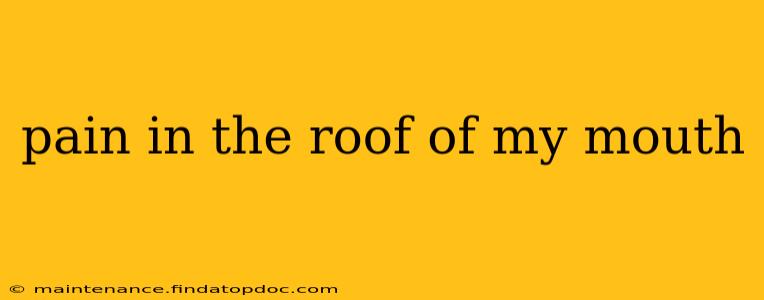Experiencing pain in the roof of your mouth, also known as the palate, can be incredibly uncomfortable and disruptive. The cause can range from minor irritations to more serious underlying conditions. This comprehensive guide will explore the various reasons why you might be experiencing this pain, along with associated symptoms and potential treatments. Understanding the potential causes is crucial for seeking appropriate relief and ensuring your overall oral health.
What Causes Pain in the Roof of My Mouth?
Several factors can contribute to pain in the roof of your mouth. Let's explore some of the most common causes:
- Mouth Injuries: Accidental burns from hot food or drinks, biting your palate, or injuries from dental work are common culprits. The pain is often sharp and localized to the area of injury.
- Canker Sores (Aphthous Ulcers): These painful, small ulcers commonly appear on the inside of the cheeks, lips, and tongue, but can also occur on the palate. They typically heal within 1-3 weeks without specific treatment.
- Cold Sores (Fever Blisters): While more common on the lips, cold sores can sometimes affect the palate. These are caused by the herpes simplex virus and are characterized by fluid-filled blisters.
- Oral Thrush (Candidiasis): This fungal infection, caused by an overgrowth of Candida yeast, can lead to a burning sensation and white patches on the palate. Oral thrush is more common in individuals with weakened immune systems.
- Dry Mouth (Xerostomia): A lack of saliva can irritate the palate, leading to dryness, burning, and discomfort. This can be caused by various factors, including medication side effects.
- Allergies: Allergic reactions to certain foods or substances can sometimes manifest as irritation and pain in the roof of the mouth.
- Burning Mouth Syndrome (BMS): This condition is characterized by a persistent burning sensation in the mouth, often affecting the palate. The exact cause is unknown, but it may be linked to hormonal changes, nutritional deficiencies, or nerve damage.
- Dental Issues: Ill-fitting dentures, orthodontic appliances, or poorly placed fillings can irritate the palate and cause pain.
- Medications: Some medications, such as chemotherapy drugs, can cause mucositis, an inflammation of the mucous membranes lining the mouth, including the palate.
- Lupus: This autoimmune disease can, in some cases, affect the mouth and cause pain in the palate.
What are the Symptoms of Pain in the Roof of My Mouth?
The symptoms associated with palate pain vary depending on the underlying cause. However, common symptoms include:
- Sharp, stabbing pain: Often associated with injuries or canker sores.
- Burning sensation: Common in oral thrush, dry mouth, and burning mouth syndrome.
- Tingling or numbness: May indicate nerve irritation or damage.
- White or red patches: Characteristic of oral thrush or other oral infections.
- Swelling or inflammation: Can be indicative of an infection or allergic reaction.
- Difficulty swallowing or speaking: Severe cases may lead to difficulties with these functions.
How is Pain in the Roof of My Mouth Treated?
Treatment for palate pain depends entirely on the underlying cause. Options include:
- Over-the-counter pain relievers: For mild pain from injuries or canker sores.
- Antiviral medications: For cold sores caused by the herpes simplex virus.
- Antifungal medications: For oral thrush.
- Artificial saliva substitutes: To relieve dryness associated with dry mouth.
- Prescription medications: For managing more severe conditions like burning mouth syndrome or mucositis.
- Dental adjustments: For issues related to dentures or other dental appliances.
- Lifestyle changes: Maintaining good oral hygiene, avoiding irritants, and staying hydrated can help prevent and alleviate some types of palate pain.
How Long Does Pain in the Roof of My Mouth Last?
The duration of pain in the roof of your mouth depends entirely on the underlying cause. Minor injuries may heal within days, while conditions like burning mouth syndrome can be long-lasting. If the pain persists for more than a week or is accompanied by other concerning symptoms, it is crucial to consult a doctor or dentist for diagnosis and treatment.
When Should I See a Doctor or Dentist?
It’s essential to seek professional medical advice if:
- The pain is severe or persistent.
- You have difficulty swallowing or speaking.
- You notice significant swelling or inflammation.
- The pain is accompanied by fever or other systemic symptoms.
- You have a weakened immune system.
This information is for general knowledge and informational purposes only, and does not constitute medical advice. It is essential to consult with a healthcare professional for any health concerns or before making any decisions related to your health or treatment. They can properly diagnose the cause of your pain and recommend the most appropriate treatment plan.
